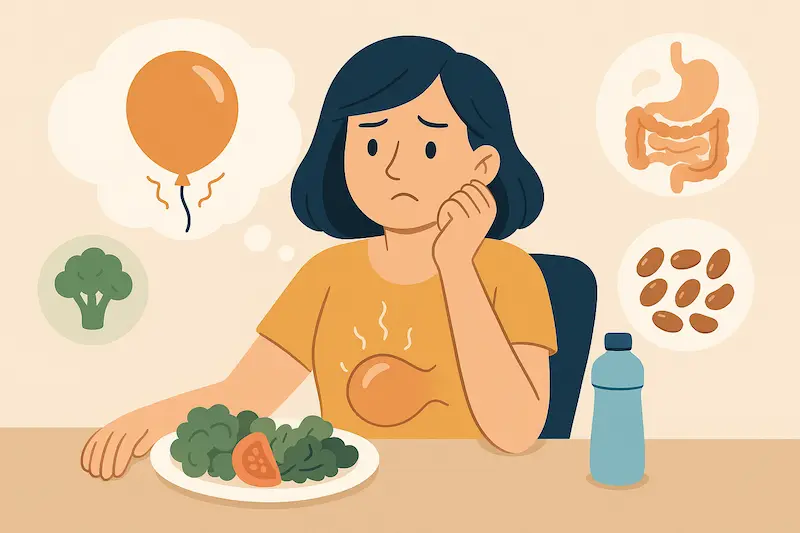🥦 The Healthy-Eating Gas Trap
So you’ve ditched the drive-thru, embraced kale, and your plate is now a Pinterest board of vibrant veggies. Great! But suddenly… 💨 you’re the brass section of a marching band.
“Why am I so gassy when I’m eating healthy?” you ask, while side-eyeing your salad.
You’re not alone. And you’re not broken.
🧠 TL;DR: Healthy Foods Can Be Too Healthy for Your Gut… at First
Healthy diets often include:
- More fiber (beans, lentils, whole grains, veggies)
- More sugar alcohols (hello, low-cal protein bars)
- More prebiotics and fermented foods
All of these are technically amazing for your gut… but also turn your intestines into a bubbly science fair volcano if you’re not used to them.
💨 Let’s Break Down the Bloat
1. Fiber: Friend or Fart Machine?
Fiber’s amazing. It feeds your gut bacteria, helps with digestion, and keeps things moving. But if you go from low-fiber to high-fiber overnight, your gut bugs freak out like it’s Black Friday at the microbiome mall. 🧬 What Exactly Is the Gut Microbiome?
Result?
Excess gas, bloating, and maybe a touch of regret.
🟢 Tip: Ramp up fiber slowly and drink loads of water.
2. Prebiotics and Fermented Foods
These are gut gold—until they’re not. Garlic, onions, bananas, kimchi, sauerkraut, kefir — they all feed the good bacteria. But when those bacteria party too hard, they create gas as a byproduct.
Mild discomfort? Normal.
Full bloat-a-saurus? Ease up and reintroduce gradually.
Read more: 🧄 5 Fermented Foods That Don’t Taste Like Mouldy Feet (and Actually Help Your Gut)
3. Are You More Gassy When Losing Weight?
Actually… yes.
If your weight loss plan includes:
- Higher protein (which can slow digestion)
- More veggies (fiber, again)
- Sugar substitutes (think erythritol, xylitol, etc.)
- Calorie restriction (which affects digestion speed and gut bacteria)
…then congratulations: you’re making changes your gut needs to catch up with.
Your microbiome doesn’t read your meal plan. It just panics, adapts, and makes a lot of noise while doing so.
🧪 Bonus Weirdness: Gut Bacteria Changing
As you shift your diet, the types and amounts of bacteria in your gut begin to change. Some create more gas. Others, less. But during that microbial Game of Thrones, things can get… turbulent.
🚽 But What If It’s Not “Just Healthy Gas”?
Sometimes excess gas can be a red flag, especially if it’s joined by:
- Chronic bloating
- Pain or cramping
- Diarrhea or constipation
- Weight loss without trying
If that’s you, talk to a professional. (Reminder: this article is general advice, not medical advice.) You can also check out 💩 The Poop Shape Decoder: What Your Stool Says About Your Gut Health (if you’re into that)
🛠️ How to De-Gas the Healthy Way
- Introduce new foods gradually. Especially fiber bombs.
- Chew thoroughly. Less air = less burpy chaos.
- Limit fizzy drinks. Sparkling water + broccoli = rocket fuel.
- Watch sugar alcohols. Especially in diet snacks and protein bars.
- Move your body. Even a walk helps relieve trapped gas.
🧠 Bottom Line
If you’re thinking:
“Why am I so gassy when I’m eating healthy?”
Or
“Are you more gassy when losing weight?”
The answer is: probably yes — but it’s temporary, normal, and even a sign your gut is adjusting to the good stuff.
Your gut is like that one coworker who freaks out when the office moves the printer. But give it time, and it adapts.
📬 Psst — Want a Cheat Sheet?
This time we’re sending all our subscribers a “Gas & Bloat Symptom Tracker” — to help you spot patterns, pinpoint trigger foods, and track your progress.
Sign up below — we won’t spam you. (But you might spam your coworkers… unintentionally.)
💡 Keep learning
- 🤯 Brain Fog After Eating? Here’s What Your Gut’s Trying to Tell You
- Why Your Kid Can’t Sleep: Midnight Farts, Monster Fears, and the Gut-Sleep Connection
- 💥 10 Sneaky Things Wrecking Your Gut Health (And What to Do Instead)

Alex Keane is a health writer and gut health researcher with a personal mission: help people stop feeling like garbage for no clear reason. After years of dealing with brain fog, digestive issues, and 3am anxiety spirals, Alex started digging into the connection between the gut and the mind — and never looked back.
When not writing about microbiomes, Alex is usually found experimenting with fermented foods, walking obsessively, or trying not to buy more supplements off Instagram.
Alex is not a doctor, and that’s probably for the best.

